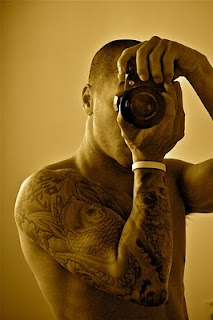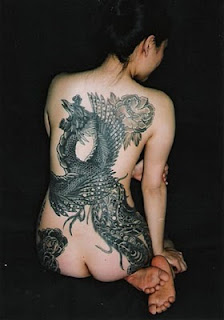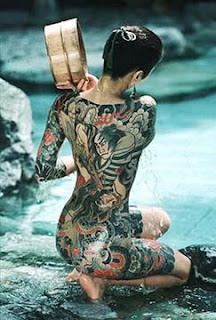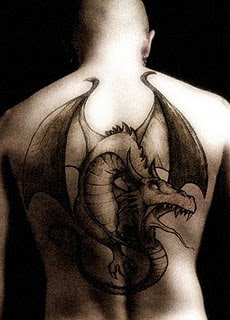 Kanji
Kanji, or Hanzi in Chinese, has obtained cult status. Practically every day I come across something with Kanji on it. Unfortunately, often times they contain blatantly ignorant mistakes. Clothes shops sell t-shirts with random Japanese letters strung together, as if it should be readable. Furniture shops offer furniture, bed covers, cushion covers, and even matching curtains with inverted and mirrored Kanji on it. Once I saw a BWM with Kanji stickers proudly decorating both side doors. It read "Viagra" in Chinese... However, these mistakes are nothing compared to the mistakes I have seen on various body parts as "Kanji tattoos."
It is truly flattering to know that Kanji and the Japanese and Chinese languages have gained such prominence and status among tattoo fans. However, if you are going to engrave something on your body, show respect for yourself, as well as for our language and culture, and learn a thing or two about the language and the art of Asian calligraphy before getting it done. Otherwise you will find yourself secretly sweating, every time a Japanese girl comments on your tattoo, wondering "Did she mean it? Or was that sarcasm in her voice?" Or worse, you might end up on one of the many Japanese websites that showcase the gibberish Kanji tattoos they have come across.
How can you avoid ending up with a Kanji tattoo that screams "amateur"?
1. Do not have Western names translated into Kanji and inked. Kanji are symbols which often have several meanings. When someone "translates" Western names into Kanji, they are simply fishing out Kanji that have the right phonetics, Kanji that sound similar to the word they are trying to translate. Take the name "Stacy" as an example. When translated into Japanese, it becomes a 5-Japanese-letter word (su-te-i-shi-i, since the word is broken up into syllables, as it should be spoken in the Japanese language). To translate it into Kanji, one would have to find five Kanji which sound like the five syllables of the name. Of course the translator would (or should) make sure they choose Kanji with positive connotations, such as "poem" as opposed to "death" (both words pronounced "shi" in Japanese) -- but be aware that if you ask ten people to translate your name into Kanji, you will likely end up with ten different results. It is that subjective, the art of "translating" names into Kanji. If you still insist on having a name inked, have it done in Katakana instead of Kanji. At least then it would be an objective symbolism of the name, in other words, without the translator's "interpretation" of your name into symbols (Kanji). However, if you are adamant about having Kanji, then my next suggestion would be to keep it short. Have the name translated into just one Kanji, for the first syllable in the name for example, and then have the Kanji inked in the design of a Hanko stamp. This is much more elegant, artistic and aesthetic than having several random Kanji that have the phonetics to sound like a Western name. To a native speaker, such strings of Kanji look extremely odd and usually need to be explained before it can be understood.
2. Keep it simple. Do not even think about translating a whole sentence or phrase. Most likely the meaning will get lost in translation. If you are keen on getting a certain message across with your tattoo, consult a native speaker and convey what it is you want to get across and see if an original Chinese or Japanese proverb can get the same point across. David Beckham's famous Chinese proverb tattoo is a great example. Direct translations should be avoided for obvious reasons.
3. Consult a reliable native speaker -- or two, to get different opinions and inputs. Do not rely on a non-native or just walk into a tattoo parlor and choose from their Kanji catalogs without any research. Many of the catalogs circulating the internet and tattoo parlors are full of translation mistakes, missing strokes, crooked Kanji that you have to tilt your head to read, and disproportional, unattractive Kanji that were clearly not written by someone with calligraphy skills. Besides, the selection is extremely limited, considering the fact that there are thousands of Kanji in the Japanese and Chinese language to choose from.
Having said all of that, let me leave you on a thought: Japanese are wary of tattoos, since we associate it with Yakuza, the Japanese mafia. In fact, most bath houses and Onsen (hot spring baths) in Japan have specific rules prohibiting people with tattoos from bathing there. It is the politically correct way of saying "Yakuza not welcome." So as flattering as it is that the Western world has come to embrace our language and incorporated it into their culture of tattooing, be aware that you will seldom meet a Japanese with a
Kanji tattoo, much less a tattoo. It is just not our culture.

 Japanese tattoos are referred to in Japanese as irezumi which literally means the insertion of ink under the skin leaving a permanent mark or tattoo. Tattooing in Japan is thought to extend back to at least 10,000 years. The Ainu people, the indigenous people of Japan, are known to have used tattoos for decorative and social purposes for many thousands of years.
Japanese tattoos are referred to in Japanese as irezumi which literally means the insertion of ink under the skin leaving a permanent mark or tattoo. Tattooing in Japan is thought to extend back to at least 10,000 years. The Ainu people, the indigenous people of Japan, are known to have used tattoos for decorative and social purposes for many thousands of years.










































